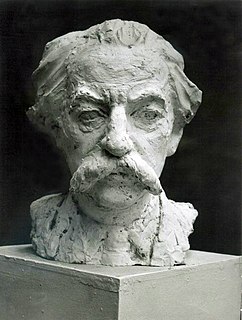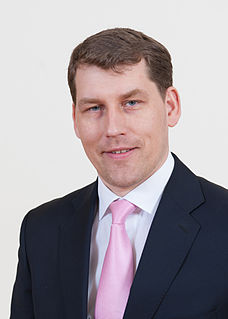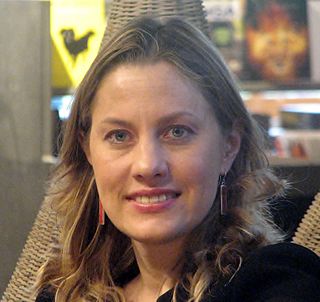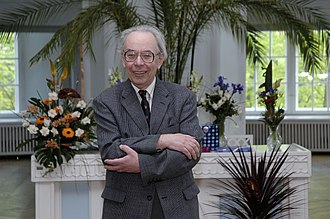
Tartu is the second largest city of Estonia, after Estonia's political and financial capital Tallinn. It is situated 186 kilometres southeast of Tallinn and 245 kilometres northeast of Riga, the capital of Latvia. The distance to Estonia's summer holiday capital Pärnu in the west is 176 kilometres and the fastest route there by car is through Viljandi and Kilingi-Nõmme. Tartu lies on the Emajõgi, which connects the two largest lakes of Estonia, Lake Võrtsjärv and Lake Peipus. The city is served by Tartu Airport.

The University of Tartu is a university in the city of Tartu in Estonia. It is the national university of Estonia, and the only classical university in the country, and also the biggest and most prestigious university in Estonia. It was founded under the name of Academia Gustaviana in 1632 by Baron Johan Skytte, the Governor- General (1629–1634) of Swedish Livonia, Ingria and Karelia, with the required ratification provided by his long-time friend and former student – from age 7 –, King Gustavus Adolphus, shortly before the king's death on 6 November in the Battle of Lützen (1632), during the Thirty Years' War (1618–1648).

Ernest André Gellner was a British-Czech philosopher and social anthropologist described by The Daily Telegraph, when he died, as one of the world's most vigorous intellectuals, and by The Independent as a "one-man crusader for critical rationalism".

Yuri Mikhailovich Lotman was a prominent literary scholar, semiotician, and cultural historian, who worked at the University of Tartu. He was elected a member of the British Academy (1977), Norwegian Academy of Science and Letters (1987), Royal Swedish Academy of Sciences (1989) and Estonian Academy of Sciences (1990). He was a founder of the Tartu–Moscow Semiotic School. The number of his printed works exceeds 800 titles. His archive which includes his correspondence with a number of Russian and Western intellectuals, is immense.

Marxism is a method of socioeconomic analysis that uses a materialist interpretation of historical development, better known as historical materialism, to understand class relations and social conflict as well as a dialectical perspective to view social transformation. It originates from the works of 19th-century German philosophers Karl Marx and Friedrich Engels. As Marxism has developed over time into various branches and schools of thought, there is currently no single definitive Marxist theory.

Leonid Naumovich Stolovich was a Russian-Estonian philosopher, Doctor of Philosophy (1966) and professor (1967). Stolovich graduated from the Leningrad University in 1952, from 1953 on he worked at Tartu University, Estonia, from 1994 on as a professor emeritus. Above all, Stolovich studied esthetics: its history, theories of esthetics and axiology. He is the author of more than forty books and 400 publications in 20 languages.
Philosophy in the Soviet Union was officially confined to Marxist–Leninist thinking, which theoretically was the basis of objective and ultimate philosophical truth. During the 1920s and 1930s, other tendencies of Russian thought were repressed. Joseph Stalin enacted a decree in 1931 identifying dialectical materialism with Marxism–Leninism, making it the official philosophy which would be enforced in all Communist states and, through the Comintern, in most Communist parties. Following the traditional use in the Second International, opponents would be labeled as "revisionists".

Alexander Moiseyevich Piatigorsky was a Soviet dissident, Russian philosopher, scholar of Indian philosophy and culture, historian, philologist, semiotician, writer. Well-versed in the study of language, he knew Sanskrit, Tamil, Pali, Tibetan, German, Russian, French, Italian and English. In an obituary appearing in the English-language newspaper The Guardian, he was cited as "a man who was widely considered to be one of the more significant thinkers of the age and Russia's greatest philosopher." On Russian television stations he was mourned as "the greatest Russian philosopher."

BC Kalev, known as BC Kalev/Cramo for sponsorship reasons, is a professional basketball club based in Tallinn, Estonia. The team plays in the Korvpalli Meistriliiga, the Estonian-Latvian Basketball League and the VTB United League. They play their home games at the Kalev Sports Hall and the Saku Suurhall.
Communism is a philosophical, social, political, and economic ideology and movement whose ultimate goal is the establishment of a communist society, namely a socioeconomic order structured upon the ideas of common ownership of the means of production and the absence of social classes, money and the state.
Indrek Visnapuu is an Estonian basketball coach and former player, who last coached Audentes/Noortekoondis of the Korvpalli Meistriliiga (KML).

Marxism is a method of socioeconomic analysis that originates in the works of 19th century German philosophers Karl Marx and Friedrich Engels. Marxism analyzes and critiques the development of class society and especially of capitalism as well as the role of class struggles in systemic economic, social and political change. It frames capitalism through a paradigm of exploitation and analyzes class relations and social conflict using a materialist interpretation of historical development - materialist in the sense that the politics and ideas of an epoch are determined by the way in which material production is carried on.

University of Tartu Viljandi Culture Academy is an Estonian institution of higher education, situated in the provincial town of Viljandi, central Estonia. The UT Viljandi Culture Academy merged with the University of Tartu in 2005. The UT VCA has been teaching professional higher education and performing applied research within information science, culture education and creative arts since 1952. The academy has about 1000 students, half of whom are open university students. The teaching and instruction are based on the continuity and sustainability of Estonian native culture enriched by new impulses which widen the notion of traditional culture. Director of the UT VCA is Dr. Iñaki Sandoval Campillo.
Mark Borisovich Mitin was a Soviet Marxist-Leninist philosopher and university lecturer, Professor of Philosophy Faculty of Moscow State University. He was interested primarily dialectical and historical materialism, the philosophy of history and criticism of "bourgeois" philosophy.

Western Marxism is a current of Marxist theory that arose from Western and Central Europe in the aftermath of the 1917 October Revolution in Russia and the ascent of Leninism. The term denotes a loose collection of theorists who advanced an interpretation of Marxism distinct from the Marxism of the Soviet Union.

Tullio Ilomets was an Estonian chemist, science historian and a volunteer in heritage protection.

Eero Spriit, is an Estonian actor, theatre producer and director, and film and television producer. Spriit's career as an actor began in the early 1970s.

Andres Metsoja is an Estonian politician. He has been a member of the XIII and XIV Riigikogu.
Dmitry Ivanovich Chesnokov was a Soviet professor of philosophy, journalist and politician.

Oudekki Loone is an Estonian politician and political scientist. She is a member of XIII and XIV Riigikogu.













